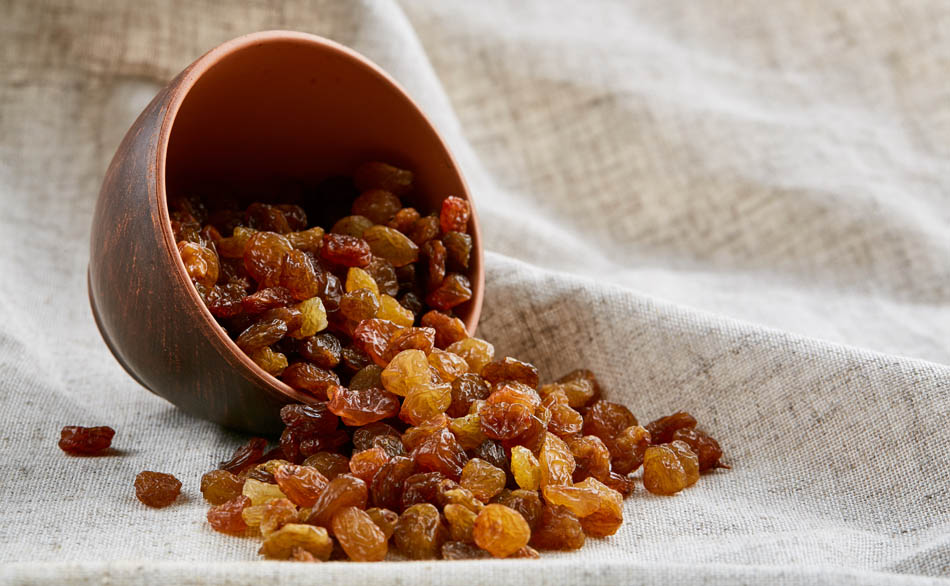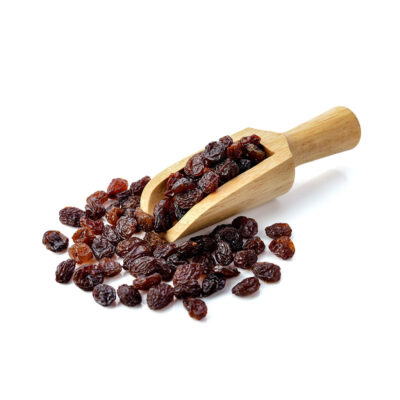Are Raisins Good for Diabetes? 3 Proven Benefits
Raisins can add a dose of natural sweetness to porridge, bread, cereal, and more. As a sugary food high in carbs, are they harmful to a diabetes diet? Learn all about the popular dried fruit in this article as we cover nutrition facts, effects on blood sugar levels, and 3 excellent health benefits of eating raisins.

A raisin is a type of dried grape.
Raisins are made from various seedless grapes, creating a variety of raisins in different colors, sizes, and flavors. All have a sweet and tangy taste, making them a great addition to all kinds of recipes for both sweet and savory dishes. You can even eat them alone as a tasty snack.
However, dried fruits, in general, are notorious for having high sugar content. While people with diabetes can still enjoy sweets and sugary foods as part of a healthy diet, it is important to moderate the amount to ensure blood sugar control. Consuming too much can cause significant spikes.
Discover in this article if you can eat raisins as part of your diabetes diet plan.
Are Raisins Good for Diabetes?
Raisins can be good for people with diabetes if eaten in moderation. Raisins are an antioxidant-packed food with a lot of health benefits. The problem is that raisins contain a lot of natural sugar and have a high carbohydrate content, with 71.7g net carbs per 100g serving. While a typical serving is around half of this amount, they still have a high amount.
Raisins have many qualities that aid a diabetes diet. They are high in dietary fiber, which helps regulate glycemic control and aids weight management. Raisin consumption may lower blood pressure and reduce diabetes and cardiovascular disease risk.
Many people avoid eating raisins because they fear consuming too much sugar. However, you can safely eat raisins if you have diabetes, as long as you carefully monitor your portion sizes. Doing so will prevent a nasty spike in blood sugar levels and support better glycemic control.
When you eat raisins in limited quantities, you can benefit from the many health-boosting effects they provide. Instead of eating raisins by the dozen, pair them with other diabetes-friendly dishes. For example, oatmeal is healthy and a great option for diabetes.
Do Raisins Raise Blood Sugar Levels?
Raisins contain carbs and natural sugar, which can raise blood sugar levels. However, raisins have a low glycemic index and plenty of dietary fiber and antioxidants that can contribute to and improve glycemic control. These low-GI foods positively affect postprandial glycemic control and may serve as a healthy snack when eaten in moderation.
Enjoying raisins from time to time will not negatively affect blood glucose. One carb serving is about 15 grams of carbs, so it’s best to eat no more than about two tablespoons. Keeping your blood sugars in check is vital for managing diabetes and preventing diabetes complications.
Nutritional Value of Raisins
Raisins have a high nutritional value with lots of health-promoting nutrients. They contain dietary fiber, protein, carbohydrates, and next to no fat. Plus, plenty of essential electrolytes, including calcium, iron, magnesium, potassium, and small amounts of copper and zinc.
Below you can find the nutrition facts of raisins based on a 100g serving.

Glycemic Index of Raisins
Raisins have a medium glycemic index of 66. Foods with a medium or low GI are broken down by your body more slowly, causing blood sugar to rise gradually. So, you can safely consume raisins in your diabetes diet plan in moderation. You shouldn’t eat them in excess!
The glycemic index is a rating system that scores foods from 0–100. The score represents the impact of a particular food on glycemic response. The food items with a higher score are broken down quickly in the body, meaning they cause a sharp spike in blood glucose levels.
Are Raisins Healthy for Those With Diabetes?
Yes, raisins are incredibly healthy and full of digestive and heart health benefits for those with diabetes. Eating raisins can reduce cardiometabolic risk factors by lowering blood pressure, blood sugar, and LDL cholesterol levels. Lowering these risks means eating raisins can reduce your risk of developing coronary heart disease and other cardiovascular diseases.
Despite their sugar and calorie content, you can consume raisins as part of a weight loss plan.
Eating raisins as an in-between snack may promote satiety due to the dietary fiber content. Furthermore, those who eat raisins are more likely to have lower body weight, BMI, and waist circumference than non-consumers. Intake is also associated with a reduced risk of obesity.
Losing weight and preventing weight gain can mitigate other health complications of diabetes and impaired glucose tolerance. Long-term weight loss can improve insulin sensitivity, and losing a significant amount of weight may reverse type 2 diabetes on rare occasions.
3 Benefits of Raisins for Diabetes
Raisins are a great addition to a healthy diet for diabetes. They have many perks for your heart, digestive system, and immune system. If that wasn’t enough, raisins also have a deliciously sweet taste, making them a bonus for those with a sweet tooth.
Below, you can find three of the top benefits of raisins for diabetes.
#1 Good for bowel movements
A 100g serving of raisins contains 6.8g of fiber. Fiber is an incredible and essential nutrient for your digestive health. The body cannot break it down, so it passes undigested through your system. Getting adequate fiber is critical for healthy bowel habits and promoting gut health.
Fiber bulks out and softens your stool. This makes passing easier, preventing constipation and promoting regular healthy bowel movements. Gastrointestinal complications are more common in people with diabetes, so taking care of your gut health is a necessary practice.
If you are trying a specific diet to help manage your diabetes, such as intermittent fasting or keto, fiber is a staple. It helps you manage your weight by promoting satiety and curbing hunger pangs.
#2 Source of antioxidants
Raisins are an excellent source of protective antioxidants, containing many more than other fruits. The high antioxidant activity comes primarily from their phenolic compounds. Antioxidants are critical for the body as they fight free radical damage from oxidative stress.
Eating a diet high in antioxidants boosts the immune system and helps reduce the risk of many chronic diseases, including cancer and cardiovascular diseases. A powerful antioxidant in raisins is vitamin C, which promotes immune defense by supporting cellular functions.
Antioxidants are also great for enhancing heart health. They can help prevent and improve cardiovascular risk factors and reduce inflammation, a leading cause of chronic disorders.
#3 Cure bloating and acidity
Raisins contain alkaline minerals, including calcium, iron, and magnesium. These properties can help neutralize and balance acidity in the stomach. As raisins increase your fiber intake, they improve your gut health and alleviate digestive issues such as bloating and constipation.
On the other hand, an influx of fiber in the diet can cause gastrointestinal distress, including bloating and gas. So, the right amount of raisins can help cure common gut problems, but too much can have the opposite adverse effect.
FAQs
Yes! Raisins are an excellent source of dietary fiber and contain more fiber than grapes. In a 100g serving, you will get 6.8g of fiber to add toward your daily fiber intake. This essential nutrient keeps your digestive system strong and your bowel movements regular.
Raisins are a minimally processed whole food. They do not contain added sugar or any other added ingredients. The sugar present in raisins is all-natural. The drying process of turning grapes into raisins concentrates the sugar content, making raisins higher in sugar.
A person with diabetes must carefully monitor their carbohydrate consumption. As raisins are fairly high in carbohydrates, it’s best to keep serving sizes small. Approximately two tablespoons are healthy, but you should check with your doctor before adding raisins to your daily diet.
A Word From a Nutritionist
Raisins are dried grapes packed with nutrients that provide many health benefits.
They can help reduce diabetes risk and, in the right doses, can positively affect glycemic response in people with diabetes. Raisins contain fructose – a type of sugar found naturally in fruits with a low glycemic index. They will not raise your blood sugars like other carbs.
As raisins have a natural sweetness, you can add raisins to blander dishes like oatmeal or overnight oats instead of using high-glycemic sweeteners. The sugar in raisins is natural and a healthier alternative to sugary snacks and other processed foods that contain added sugar.
Another dried fruit option for a nutritious snack is dates, which are also good for diabetes.
Conclusion
Raisins and other fruits are fantastic sources of antioxidants and fiber. Although they contain carbs, they do not significantly impact blood sugar and insulin levels. Replacing high-GI foods with high-fiber foods with a lower GI will aid glucose control.
As raisins are small and taste so good, it is super easy to over-snack on them. The trick is only to eat raisins in limited amounts. So, instead of munching on them by the handful, you can try eating raisin meals. For example, you could sprinkle raisins onto salads, yogurt, and cereals.

















































 Select your language:
Select your language: 








